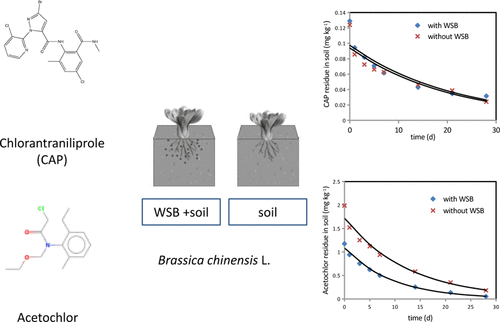Our official English website, www.x-mol.net, welcomes your
feedback! (Note: you will need to create a separate account there.)
Effect of Biochar on the Degradation Dynamics of Chlorantraniliprole and Acetochlor in Brassica chinensis L. and Soil under Field Conditions
ACS Omega ( IF 3.7 ) Pub Date : 2020-12-29 , DOI: 10.1021/acsomega.0c04268
Caixia Sun 1, 2, 3 , Ke Bei 4 , Yanmei Xu 1 , Zhiyan Pan 1
ACS Omega ( IF 3.7 ) Pub Date : 2020-12-29 , DOI: 10.1021/acsomega.0c04268
Caixia Sun 1, 2, 3 , Ke Bei 4 , Yanmei Xu 1 , Zhiyan Pan 1
Affiliation

|
Although biochar is a promising soil enhancement material, we have limited understanding of its effect on certain pesticide in soils and plants under field conditions. The aim of this study was to examine the impact of walnut shell biochar (WSB), which is rich in benzylic ring C and lignin charcoal, on the degradation dynamics of chlorantraniliprole (CAP) and acetochlor in Brassica chinensis L. fields. The functional group structure, aromatic ring structure, and crystallite size of the WSB were determined by thermogravimetric analysis and derivative thermogravimetry analysis (TGA–DTG), NMR, Raman spectroscopy, and X-ray diffraction, respectively. With WSB applications of 5% (v/v) in root soil, B. chinensis L. growth was facilitated. Degradation dynamic analysis showed that the half-life of CAP on B. chinensis L. and in soil did not change greatly. For acetochlor, the half-life in soil was 6.93 days with WSB application and 9.90 days without WSB application. The WSB application increased bioconcentration factor values more significantly for acetochlor than for CAP. These results show that WSB has a greater impact on acetochlor than on CAP when used for pesticide degradation in the field.
中文翻译:

田间条件下生物炭对小白菜和土壤中氯氰菊酯和乙草胺降解动力学的影响
尽管生物炭是一种有前途的土壤改良材料,但在田间条件下,我们对生物炭对土壤和植物中某些农药的作用了解有限。本研究的目的是研究富含苄基环C和木质素木炭的核桃壳生物炭(WSB)对小白菜田中菜青素(CAP)和乙草胺的降解动力学的影响。WSB的官能团结构,芳环结构和微晶尺寸分别通过热重分析和微分热重分析(TGA-DTG),NMR,拉曼光谱和X射线衍射确定。在根际土壤中华白菜中采用5%(v / v)的WSB施用L.的生长得到促进。降解动力学分析表明,CAP在中华白僵菌和土壤中的半衰期变化不大。对于乙草胺,使用WSB的土壤的半衰期为6.93天,不使用WSB的土壤的半衰期为9.90天。WSB的应用增加了乙草胺的生物浓缩因子值,而不是CAP。这些结果表明,在田间用于农药降解时,WSB对乙草胺的影响大于对CAP的影响。
更新日期:2021-01-12
中文翻译:

田间条件下生物炭对小白菜和土壤中氯氰菊酯和乙草胺降解动力学的影响
尽管生物炭是一种有前途的土壤改良材料,但在田间条件下,我们对生物炭对土壤和植物中某些农药的作用了解有限。本研究的目的是研究富含苄基环C和木质素木炭的核桃壳生物炭(WSB)对小白菜田中菜青素(CAP)和乙草胺的降解动力学的影响。WSB的官能团结构,芳环结构和微晶尺寸分别通过热重分析和微分热重分析(TGA-DTG),NMR,拉曼光谱和X射线衍射确定。在根际土壤中华白菜中采用5%(v / v)的WSB施用L.的生长得到促进。降解动力学分析表明,CAP在中华白僵菌和土壤中的半衰期变化不大。对于乙草胺,使用WSB的土壤的半衰期为6.93天,不使用WSB的土壤的半衰期为9.90天。WSB的应用增加了乙草胺的生物浓缩因子值,而不是CAP。这些结果表明,在田间用于农药降解时,WSB对乙草胺的影响大于对CAP的影响。







































 京公网安备 11010802027423号
京公网安备 11010802027423号